
A sign displayed at the National Archives building in Washington, D.C., which was closed on Dec. 22, 2018 because of the federal government shutdown. Andrew Caballero-Reynolds/AFP via Getty Images
Court Weighs Whether to Pay Damages to Employees Who Worked During 2018's Record-Long Shutdown
The Biden administration argues the government's hands were tied and it did not violate labor law.
Tens of thousands of federal employees could soon receive payments for damages suffered during the 2018 shutdown after a court heard arguments on Wednesday that the government violated federal law when it failed to deliver paychecks on time to its workers.
The U.S. Court of Appeals for the Federal Circuit consolidated arguments from three different lawsuits in which federal employees are seeking liquidated damages for missing multiple paychecks during the record-breaking, 35-day lapse in appropriations, hearing from plaintiffs that the government violated the requirements of the Fair Labor Standards Act.
A Federal Claims judge ruled in 2020 that the government had violated the law, a decision the government appealed. The same lower court judge ruled in a lawsuit following the 16-day shutdown in 2013 that the government violated the FLSA and that the 25,000 feds who opted into that case were entitled to monetary damages.
The three-judge panel expressed some skepticism of the plaintiffs’ cases, which were brought separately by members of the National Treasury Employees Union, the American Federation of Government Employees and others. One judge said that because the government's hands are tied by the Antideficiency Act, which prevents agencies from distributing funds during a shutdown, a ruling against the government would mean federal employees who work during a funding lapse are entitled to bonus pay every time one occurs.
“It seems unlikely to me that Congress, knowing why it uses government shutdowns and how they happen, that it would have automatically intended for an FLSA violation to occur every time one happens,” the judge said.
Mark Stern, an attorney for the Justice Department, said Congress made clear employees should be paid as soon as possible and in the event of a shutdown, that occurs only when appropriations are restored.
“There is no basis for coming to the conclusion that people who did not work deserve more pay than those who did,” Stern said.
At times, the panel of judges expressed sympathy for the plaintiffs’ argument. There is no “impossibility clause” in the FLSA that allows for violations when another statute prevents timely payments, a second judge said. He added the government can seek a special appropriation—even during a shutdown—to pay employees on time, as it did with the 2013 Pay Our Military Act.
Heidi Burakiewicz, one of the attorneys arguing on behalf of the employees, said Congress' hands were not tied as it simply could have passed spending bills on time.
“There didn’t need to be a budget impasse,” Burakiewicz said. “There didn’t need to be a political dispute.”
Leon Dayan, another attorney on the case, said the Antideficiency Act was "not intended as a get out of jail free card."
Due to the timing of paycheck distribution during the 2013 shutdown, plaintiffs in that case were only due $290 plus any overtime they were owed. Should the court again award liquid damages, plaintiffs in this case would be owed a full four weeks of the federal minimum wage—or $1,160—in addition to any overtime they worked. Federal employees must affirmatively opt into the new case to receive any potential award.
Tony Reardon, NTEU's president, said the government acted illegally when it failed to pay its employees on time and said many feds could not pay their bills on time.
“We were pleased to be able to argue our case in court today and I am hopeful that the judges will recognize that these employees were harmed as a matter of fairness and as a matter of law,” Reardon said. “Much time has passed since that disastrous 35-day shutdown but we need to remember that these federal employees were required to be on the job even though the paychecks had stopped.”
More than 18,000 employees have joined NTEU’s case, while 32,000 had joined AFGE’s as of last year. The cases involve only employees forced to work during the shutdown, which was about 500,000 individuals.







